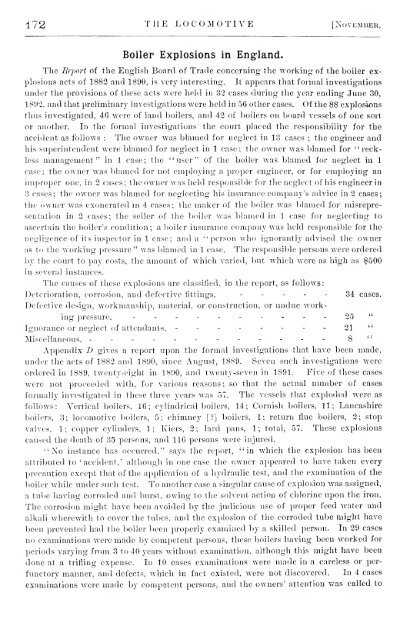The Locomotive - Lighthouse Survival Blog
The Locomotive - Lighthouse Survival Blog
The Locomotive - Lighthouse Survival Blog
You also want an ePaper? Increase the reach of your titles
YUMPU automatically turns print PDFs into web optimized ePapers that Google loves.
172 THE LOCOMOTIVE [November,<br />
Boiler Explosions in England.<br />
<strong>The</strong> Report of the English Board of Trade concerning the working of the boiler ex-<br />
plosions acts of 1882 and 1890, is very interesting. It appears that formal investigations<br />
under the provisions of these acts were held in 32 cases during the year ending June 30,<br />
1892, and that preliminary investigations were held in 56 other cases. Of the 88 explosions<br />
thus investigated, 46 were of land boilers, and 42 of boilers on board vessels of one sort<br />
or another. In the formal investigations the court placed the responsibility for the<br />
accident as follows : <strong>The</strong><br />
owner was blamed for neglect in 13 cases ; the engineer and<br />
his superintendent were blamed for neglect in 1 case; the owner was blamed for "reck-<br />
less management" in 1 case; the "user" of the boiler was blamed for neglect in 1<br />
case; the owner was blamed for not employing a proper engineer, or for em2:)loying an<br />
improper one, in 2 cases; the owner was held responsible for the neglect of his engineer in<br />
3 cases; the owner was blamed for neglecting his insurance company's advice in 2 cases;<br />
the owner was exonerated in 4 cases; the maker of the boiler w-as blamed for misrepre-<br />
sentation in 2 cases; the seller of the boiler was blamed in 1 case for neglecting to<br />
ascertain the boiler's condition ; a boiler insurance company was held responsible for the<br />
negligence of its inspector in 1 case; and a "person who ignorantly advised the owner<br />
as to the working pressure " was blamed in 1 case. <strong>The</strong> responsible jiersons were ordered<br />
by the court to pay costs, the amount of which varied, but which were as high as<br />
in several instances.<br />
<strong>The</strong> causes of these explosions are classified, in the report, as follows:<br />
-....<br />
Deterioration, corrosion, and defective fittings, - . - . . 34<br />
Defective design, workmanship, material, or construction, or undue working<br />
pressure,<br />
Ignorance or neglect of attendants, --------<br />
Miscellaneous, ------------<br />
Ajipendix D gives a report upon the formal investigations that have been made,<br />
under the acts of 1882 and 1890, since August, 1889. Seven such investigations were<br />
ordered in 1889, twenty-eight in 1890, and twenty-seven in 1891. Five of these cases<br />
were not proceeded with, for various reasons; so that the actual number of cases<br />
formally investigated in these three years was 57. <strong>The</strong> vessels that exploded were as<br />
follows: Vertical boilers, 16; cylindrical boilers, 14; Cornish boilers, 11; Lancashire<br />
boilers, 3; locomotive boilers, 5; chimney [?] boilers, 1; return flue boilers, 2; stoji<br />
valves, 1 ; copper cylinders, 1 ; Kiers, 2 ; lard pans, 1 ; total, 57. <strong>The</strong>se explosions<br />
caused the death of 35 persons, and 116 persons were injured.<br />
"No instance has occurred," says the report, "in which the explosion has been<br />
attributed to 'accident,' although in one case the owner appeared to have taken every<br />
precaution except that of the application of a hydraulic test, and the examination of the<br />
boiler while under such test. To another case a singular cause of explosion was assigned,<br />
a tube having corroded and burst, owing to the solvent action of chlorine upon the iron.<br />
<strong>The</strong> corrosion might have been avoided by the judicious use of proper feed water and<br />
alkali wherewith to cover the tubes, and the explosion of the corroded tube might have<br />
been prevented had the boiler been properly examined by a skilled person. In 29 cases<br />
no examinations were made by competent persons, these boilers having been worked for<br />
periods varying from 3 to 40 years without examination, although this might have been<br />
done at a trifling expense. In 10 cases examinations were made in a careless or per-<br />
functory manner, and defects, which in fact existed, were not discovered. In 4 cases<br />
examinations were made by competent persons, and the owners' attention was called to
















